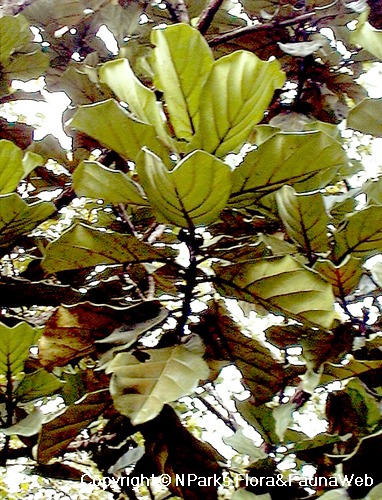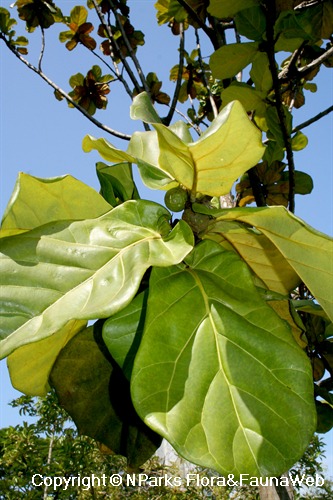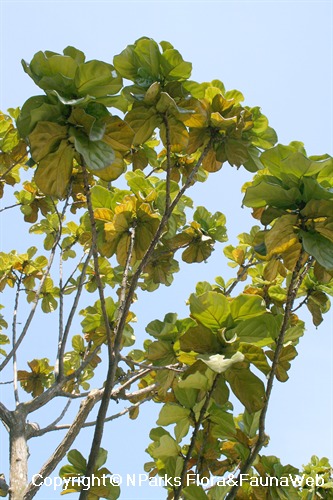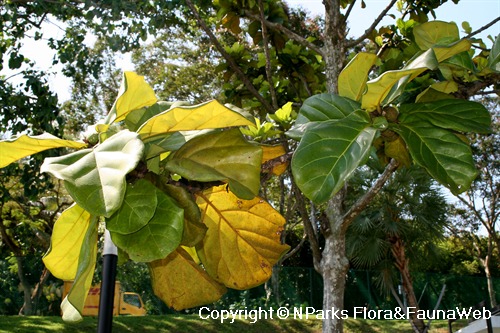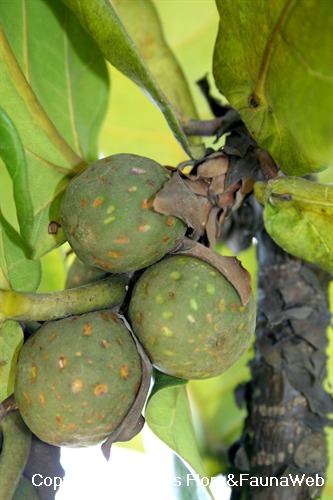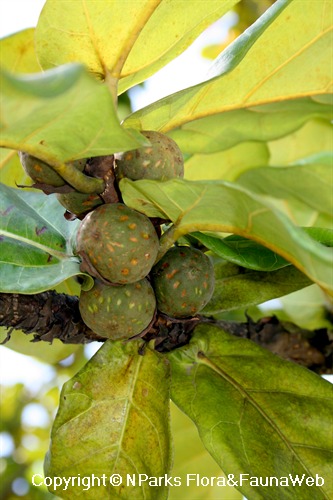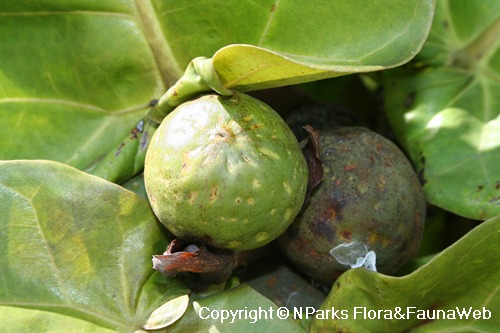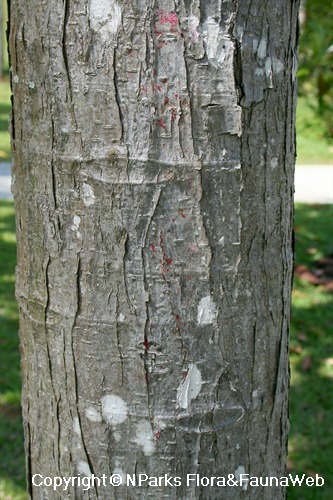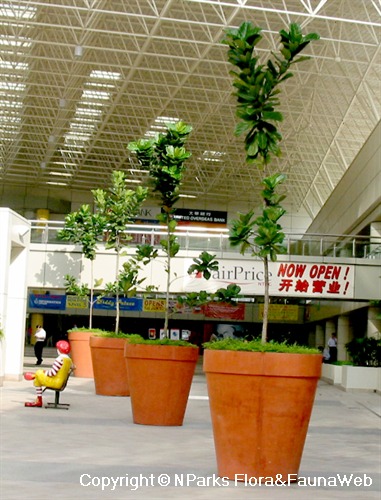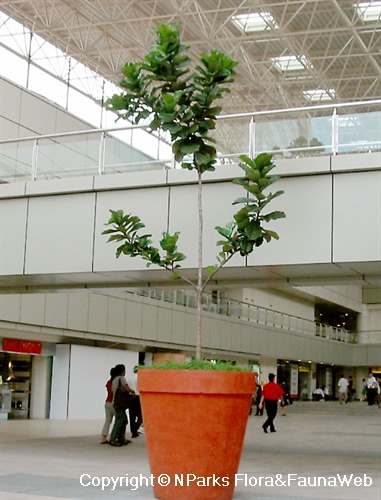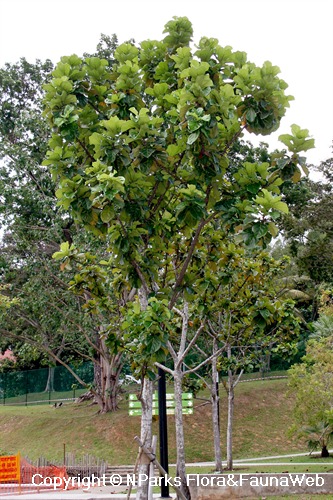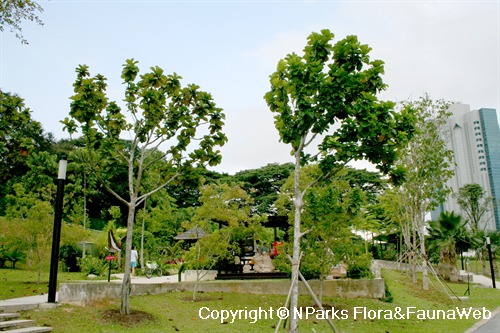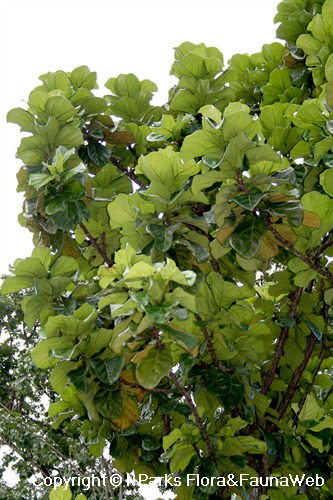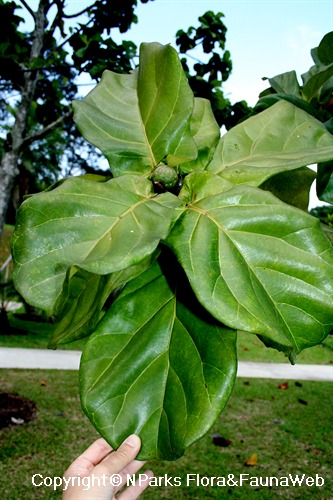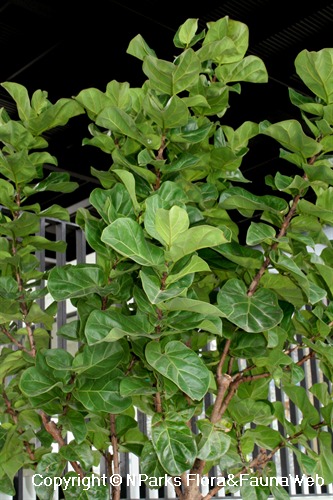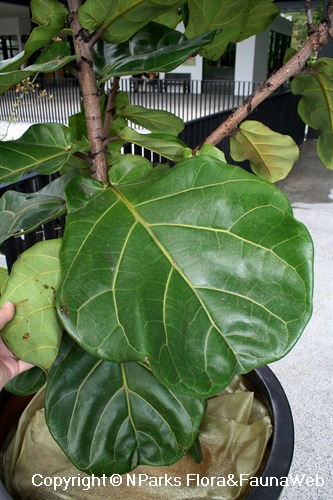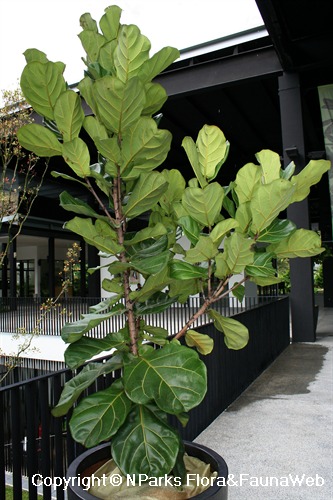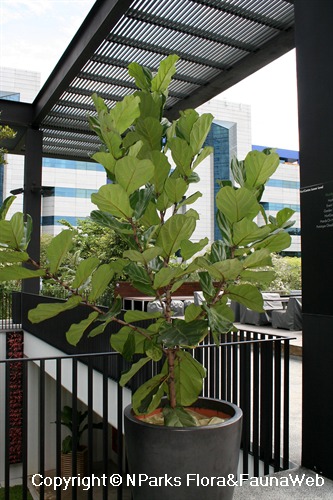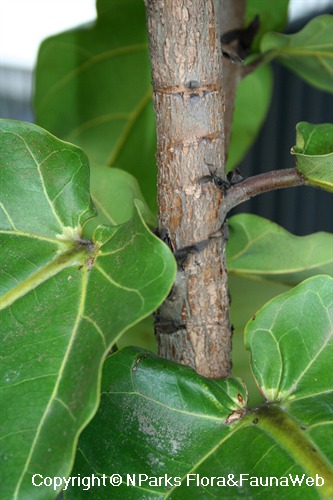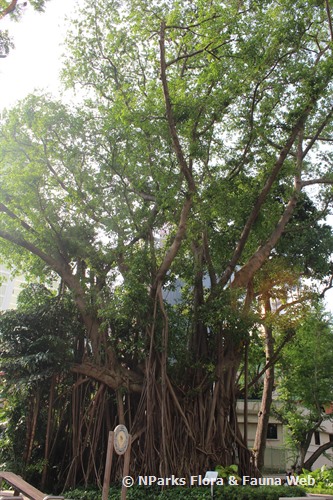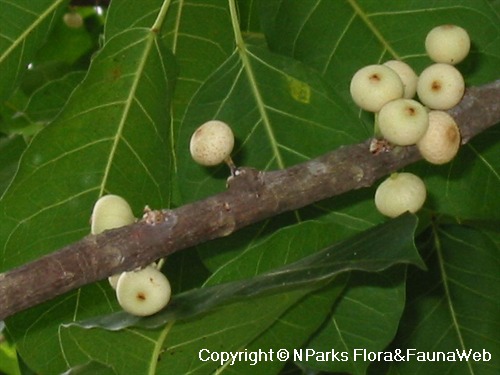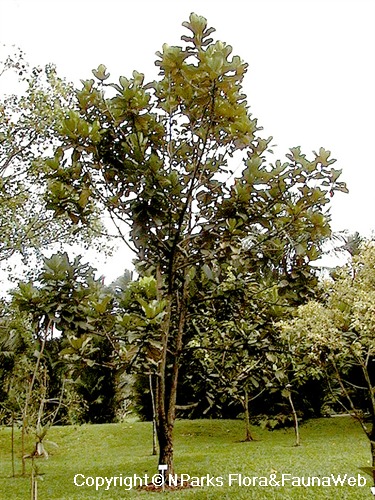
Back
Ficus lyrata Warb.
| Family Name: | Moraceae |
| Synonyms: | Ficus pandurata (Sander ex Watson) |
| Common Name: | Fiddle-leaf Fig, Fiddle-leaf, Banjo Fig, Lyre-leaf Figtree, 琴叶榕, 提琴叶榕 |
Name
Classifications and Characteristics
| Plant Division | Angiosperms (Flowering Seed Plants) (Dicotyledon) |
|---|---|
| Plant Growth Form | Tree (Medium (16m-30m), Small (6m-15m)), Shrub |
| Mode of Nutrition | Autotrophic |
| Plant Shape | Irregular |
| Maximum Height | 3 m to 12 m |
| Maximum Plant Spread / Crown Width | 9 m |
Biogeography
| Native Distribution | Tropical Central & West Africa |
|---|
Description and Ethnobotany
| Growth Form | Small to medium-sized tree, up to 12m height when grown in ground, but can reach 30m in native habitat. Crown sparse in young trees, but dense and rounded in mature trees under ideal conditions. |
|---|---|
| Trunk | Solitary, with greyish shallowly-cracked bark. |
| Foliage | Glossy dark green, leathery, large (45cm by 30cm), yellowish veins prominent on upper surface and bulging below, obovate to lyrate (lyre-shaped) or pandurate (fiddle-shaped), often with wavy margins. |
| Flowers | Minute, numerous, hidden on inner wall of synconium receptacles. Species is monoecious, with male / gall (sterile) and female flowers found in separate synconiums on the same tree. |
| Fruit | Globose, fleshy hollow synconiums, green with depressed yellow spots, very dense and hard, 3 - 5cm across, with persistent basal stipules, sessile (stalkless), bore in pairs in leaf axils at branch tips. Mature specimens planted outdoors reported to produce figs seasonally in Singapore. But the process is suspected to be parthenogenic, resulting in figs with non-viable seeds due to absence of the associated pollinator-wasp Agaon spatulatum from Africa. |
| Others - Plant Morphology | Category: Non-strangling fig tree. Ethymology: Genus epithet 'Ficus' derived from Latin name for edible fig Ficus carica. Species epithet 'lyrata' means 'like a lyre', a reference to the shape of the foliage. |
| Habitat | Distributed in lowland rainforests across tropical Africa. |
| Cultivation | Slow-growing but hardy, prefers full sun but takes bright shade when young. Keep soil moist, avoid overwatering and do not allow plant to stand in excess water to prevent root rot. Too much or too little water and insufficient light will result in dying of lower older leaves. Potted young trees tend to assume leggy monopodial form, with single non-branching stem -- prune growing tip or top the plant from an early age to encourage branching. Propagate by air-layering (use 1 - 2 year old branches) or stem cuttings (use rooting hormone). Reportedly more difficult to propagate by vegetative means than other Ficus species. Note: All cut or bruised plant surfaces exude a milky sap that may cause skin irritation in susceptible individuals, and is toxic if ingested. |
Landscaping Features
| Desirable Plant Features | Ornamental Foliage, Ornamental Fruits |
|---|---|
| Landscape Uses | Interiorscape/ Indoor Plant, Container Planting |
Fauna, Pollination and Dispersal
| Fauna Pollination Dispersal Associated Fauna | Butterfly Host Plant |
|---|---|
| Pollination Method(s) | Biotic (Fauna) (Insects (Ant, Beetle, Fly, Thrip, Wasp)) |
Plant Care and Propagation
| Light Preference | Semi-Shade, Full Sun |
|---|---|
| Water Preference | Moderate Water |
| Plant Growth Rate | Moderate |
| Rootzone Tolerance | Easy to Grow |
Foliar
| Foliage Retention | Evergreen |
|---|---|
| Mature Foliage Colour(s) | Green |
| Mature Foliage Texture(s) | Smooth, Glossy / Shiny, Leathery, Raised / Sunken Veins, Thick |
| Foliar Type | Simple / Unifoliate |
| Foliar Arrangement Along Stem | Alternate |
| Foliar Shape(s) | Non-Palm Foliage (Obcordate) |
| Foliar Venation | Pinnate / Net |
| Foliar Margin | Entire, Entire - Wavy / Undulate |
| Foliar Apex - Tip | Emarginate |
| Foliar Base | Cordate |
| Typical Foliar Area | Macrophyll ( 182.25cm2 - 1640.25 cm2 ) |
| Leaf Area Index (LAI) for Green Plot Ratio | 4.0 (Tree - Dense Canopy) |
Non - Foliar and Storage
| Trunk Type (Non Palm) | Woody |
|---|---|
| Mature Bark Texture | Scaly |
| Stem Type & Modification | Woody |
| Root Type | Underground (Tap Root, Fibrous Root) |
Floral (Angiosperm)
| Flower & Plant Sexuality | Unisexual Flowers , Monoecious |
| Flower Colour(s) | Cream / Off-White |
|---|
| Inflorescence Type | Syconium |
| Flowering Habit | Polycarpic |
| Flowering Period Remarks | Flowering/ fruiting takes place seasonally in Singapore. |
Fruit, Seed and Spore
| Mature Fruit Colour(s) | Green |
|---|---|
| Fruit Classification | Simple Fruit |
| Fruit Type | Fleshy Fruit , Multiple Syconium (receptacle) |
Image Repository
Others
| Master ID | 1618 |
|---|---|
| Species ID | 2911 |
| Flora Disclaimer | The information in this website has been compiled from reliable sources, such as reference works on medicinal plants. It is not a substitute for medical advice or treatment and NParks does not purport to provide any medical advice. Readers should always consult his/her physician before using or consuming a plant for medicinal purposes. |

